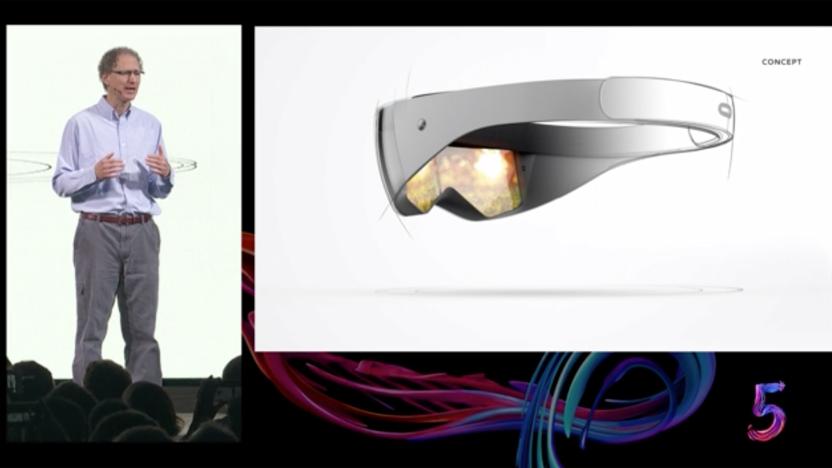waveguide
Latest

Oculus predicts a VR future that includes ultra-thin headsets
Oculus' virtual reality ambitions extend well past standalone headsets. In a talk at Oculus Connect 5, the company's Michael Abrash updated his predictions for the future of VR headset technology. Most notably, he sees an end to the bulky headsets that define the experience today. Pancake lenses (already in use with interchangeable lens cameras) could slim down headsets or lead to ultra-wide fields of view, but the real star may be waveguide displays, where light bounces down extremely thin glass plates. You could see VR headsets that are scarcely thicker than glasses, with images that are as wide as you need. Abrash showed a concept drawing (this isn't a hint at a future product, he stressed) for a headset that would make your Rift or Go look positively ancient, although he wouldn't predict just when you might see such a device.

Facebook patent reveals more details about its AR glasses
Mark Zuckerberg showed off a render of the AR glasses Facebook is working on last year, but he didn't reveal a lot of details about the device. Now, we finally know a bit more about it, thanks to a new patent application filed by members of Oculus' advanced research division. The application, obtained by Business Insider, is for "waveguide display with two-dimensional scanner" that "may augment views of a physical, real-world environment with computer-generated elements."

Future phones will have security measures built into the glass
The glass on your smartphone screen doesn't do a lot right now: it lets pictures and touch input get through, and that's about it. It may pick up a few extra talents in the future, though. Researchers at Polytechnique Montreal have developed sensors that can sit under the surface of the scratch-resistant Gorilla Glass used in many mobile devices. Their approach etches optical waveguides into the display, letting it track changes in light. As a result, the screen can do things that would normally require either wiring or dedicated sensors. Your phone could check its temperature using light, and the manufacturer could even embed a unique optical pattern into the glass that lets the phone identify itself; it might get much harder to clone a device (and, presumably, its information).

Vuzix plans to make smart sunglasses you'd actually like to wear
Although smart sunglasses exist (like Recon's above), they're seldom pretty by the usual standards -- you won't impress many people at the beach. If Vuzix has its way, though, these shades will be as fashionable as the eyewear from your favorite label. It has just reached a deal with an unnamed major electronics company that could lead to smart glasses that look just as good as "designer sunglasses;" see-through waveguide optics would keep the display relatively subtle. Just don't hold off on buying any traditional gear in the meantime. Vuzix doesn't expect to build prototypes before 2015, let alone a finished product. Still, it's good to know that smart sunglasses and style won't be mutually exclusive at some point in the future.

